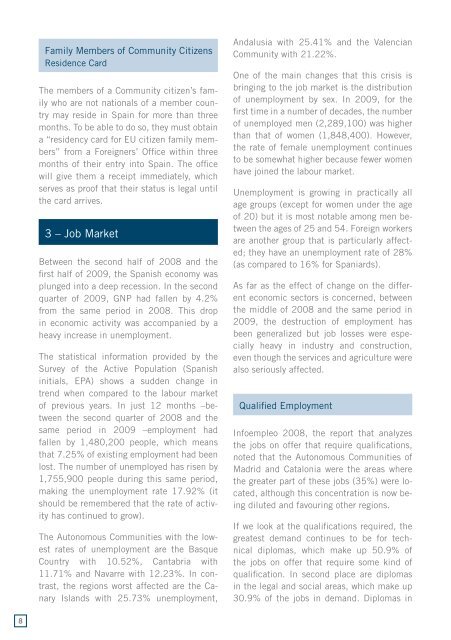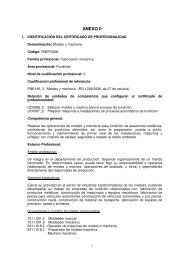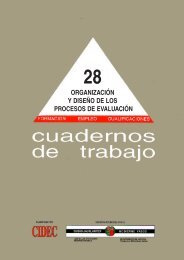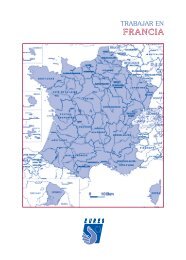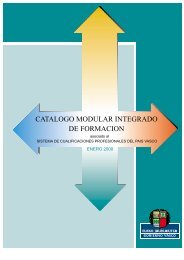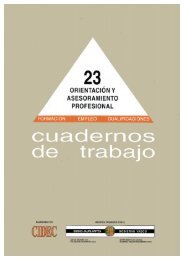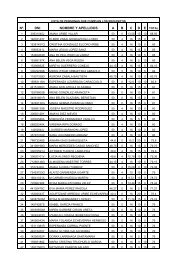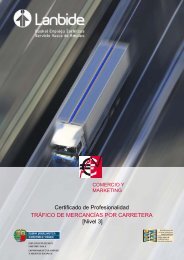Working in Spain Employment - Lanbide
Working in Spain Employment - Lanbide
Working in Spain Employment - Lanbide
Create successful ePaper yourself
Turn your PDF publications into a flip-book with our unique Google optimized e-Paper software.
8<br />
Family Members of Community Citizens<br />
Residence Card<br />
The members of a Community citizen’s family<br />
who are not nationals of a member country<br />
may reside <strong>in</strong> Spa<strong>in</strong> for more than three<br />
months. To be able to do so, they must obta<strong>in</strong><br />
a “residency card for EU citizen family members”<br />
from a Foreigners’ Office with<strong>in</strong> three<br />
months of their entry <strong>in</strong>to Spa<strong>in</strong>. The office<br />
will give them a receipt immediately, which<br />
serves as proof that their status is legal until<br />
the card arrives.<br />
3 – Job Market<br />
Between the second half of 2008 and the<br />
first half of 2009, the Spanish economy was<br />
plunged <strong>in</strong>to a deep recession. In the second<br />
quarter of 2009, GNP had fallen by 4.2%<br />
from the same period <strong>in</strong> 2008. This drop<br />
<strong>in</strong> economic activity was accompanied by a<br />
heavy <strong>in</strong>crease <strong>in</strong> unemployment.<br />
The statistical <strong>in</strong>formation provided by the<br />
Survey of the Active Population (Spanish<br />
<strong>in</strong>itials, EPA) shows a sudden change <strong>in</strong><br />
trend when compared to the labour market<br />
of previous years. In just 12 months –between<br />
the second quarter of 2008 and the<br />
same period <strong>in</strong> 2009 –employment had<br />
fallen by 1,480,200 people, which means<br />
that 7.25% of exist<strong>in</strong>g employment had been<br />
lost. The number of unemployed has risen by<br />
1,755,900 people dur<strong>in</strong>g this same period,<br />
mak<strong>in</strong>g the unemployment rate 17.92% (it<br />
should be remembered that the rate of activity<br />
has cont<strong>in</strong>ued to grow).<br />
The Autonomous Communities with the lowest<br />
rates of unemployment are the Basque<br />
Country with 10.52%, Cantabria with<br />
11.71% and Navarre with 12.23%. In contrast,<br />
the regions worst affected are the Canary<br />
Islands with 25.73% unemployment,<br />
Andalusia with 25.41% and the Valencian<br />
Community with 21.22%.<br />
One of the ma<strong>in</strong> changes that this crisis is<br />
br<strong>in</strong>g<strong>in</strong>g to the job market is the distribution<br />
of unemployment by sex. In 2009, for the<br />
first time <strong>in</strong> a number of decades, the number<br />
of unemployed men (2,289,100) was higher<br />
than that of women (1,848,400). However,<br />
the rate of female unemployment cont<strong>in</strong>ues<br />
to be somewhat higher because fewer women<br />
have jo<strong>in</strong>ed the labour market.<br />
Unemployment is grow<strong>in</strong>g <strong>in</strong> practically all<br />
age groups (except for women under the age<br />
of 20) but it is most notable among men between<br />
the ages of 25 and 54. Foreign workers<br />
are another group that is particularly affected;<br />
they have an unemployment rate of 28%<br />
(as compared to 16% for Spaniards).<br />
As far as the effect of change on the different<br />
economic sectors is concerned, between<br />
the middle of 2008 and the same period <strong>in</strong><br />
2009, the destruction of employment has<br />
been generalized but job losses were especially<br />
heavy <strong>in</strong> <strong>in</strong>dustry and construction,<br />
even though the services and agriculture were<br />
also seriously affected.<br />
Qualified <strong>Employment</strong><br />
Infoempleo 2008, the report that analyzes<br />
the jobs on offer that require qualifications,<br />
noted that the Autonomous Communities of<br />
Madrid and Catalonia were the areas where<br />
the greater part of these jobs (35%) were located,<br />
although this concentration is now be<strong>in</strong>g<br />
diluted and favour<strong>in</strong>g other regions.<br />
If we look at the qualifications required, the<br />
greatest demand cont<strong>in</strong>ues to be for technical<br />
diplomas, which make up 50.9% of<br />
the jobs on offer that require some k<strong>in</strong>d of<br />
qualification. In second place are diplomas<br />
<strong>in</strong> the legal and social areas, which make up<br />
30.9% of the jobs <strong>in</strong> demand. Diplomas <strong>in</strong>


